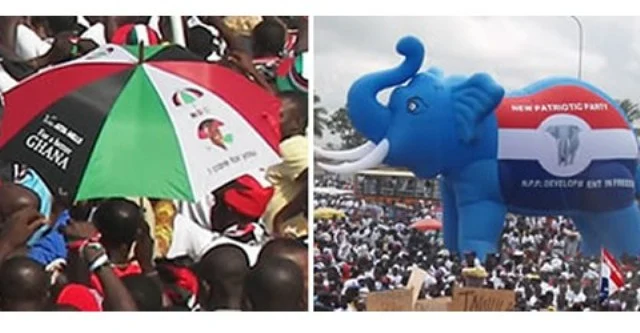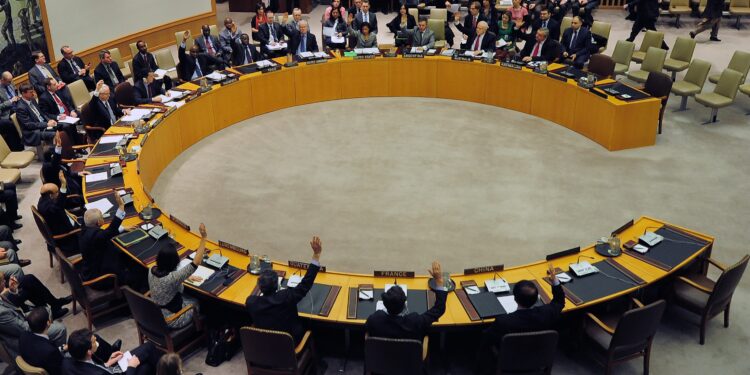With Ghana’s 2024 general elections fast approaching, the political landscape is once again shaped by deep-seated regional loyalties and evolving swing regions.
An extensive poll by SBM Intelligence, an Africa-focused geopolitical research firm, has provided critical insights into the dynamics at play, projecting an intense contest between the two major political parties, the National Democratic Congress (NDC) and the New Patriotic Party (NPP).
“Ghana is divided into 16 administrative regions, three of which are considered swing regions that can determine the outcome of presidential elections. The remaining 13 regions are traditionally split between NPP and NDC unevenly, with each party maintaining strongholds”.
SBM Intelligence, September 2024
Referencing historical records, the poll noted that no presidential candidate has won the highest office without securing victories in the swing regions, which hold the key to any party’s pathway to power.
However, the report further noted that Ghana’s electoral balance is more than just about swing regions, asserting that thirteen of the country’s regions are staunchly divided between the NPP and NDC, but unevenly.
It posited that the NPP maintains strongholds in five regions, while the NDC dominates eight, adding that despite this numerical advantage, the NPP’s electoral regions boast more voting power per region, tipping the scales in their favour.
This geographical advantage according to the poll has allowed the NPP to win national elections by securing fewer regions compared to the NDC, which must win more regions to secure a majority.
“The NPP’s five regions hold an average of 35.10% of the national vote, while the NDC’s eight regions account for a combined 29.57%. This disparity in vote power explains why the NPP has historically been able to win national elections by securing fewer regions, while the NDC typically needs to win a larger number of regions to secure a national majority.
“In essence, the NPP’s strongholds have greater voting power per region, giving the party an electoral advantage despite controlling fewer regions compared to the NDC”.
SBM Intelligence, September 2024
NDC to Win 11 Regions, NPP to Win 5
In the upcoming elections, SBM Intelligence projected that the NDC will secure victories in 11 of Ghana’s 16 regions, including all three swing regions—Central, Western, and Greater Accra.
This would leave the NPP with only five regions, despite its expected dominance in the Ashanti Region. Even there, the report projected that the NPP’s grip may be loosening, as the party is projected to win around 70.5% of the Ashanti vote, down from the 72.8% it achieved in 2020.
According to the poll, the NDC’s resurgence in traditionally contested regions is a critical factor shaping the race. The party is projected to reclaim its influence in Greater Accra, Central, and Western regions, echoing its performance from the 2012 election.
The report emphasized that these regions will be a crucial battleground, as both parties vie for dominance in areas that could tip the scales in the presidential race.
The stakes according to SBM Intelligence are particularly high in Greater Accra, which holds the largest share of the national vote. It pointed out that after the NPP lost the region in 2020 but still secured the presidency, the dynamics have shifted, and the NDC will aim to capitalize on its historical support base there.
Meanwhile, the NDC’s foothold in the northern regions, especially the Northern, Upper East, Upper West, and Savannah regions, according to the poll has strengthened.
These regions, historically NDC strongholds, are expected to remain in the party’s control, however, the report revealed that the Northern Region presents a significant challenge, as the NPP is actively working to erode the NDC’s dominance.

Bawumia’s Dominance in the North
The SBM Intelligence report pointed out that the NPP’s growing influence, particularly driven by the candidacy of Vice President Dr Mahamudu Bawumia, a native of the North, is expected to intensify the contest for votes.
‘While the NDC has historically dominated this region, the NPP’s growing influence, driven by strategic campaigning and Bawumia’s candidacy, could shift the dynamics”.
SBM Intelligence, September 2024
In particular, the report revealed that North East Region, Dr Bawumia’s home base, will be one to watch with the projection that the NPP would capitalize on the Vice President’s popularity to maintain and potentially expand its narrow victory there in 2020.
Projections suggest that the NPP’s vote share in the North East could rise from 51.40% in 2020 to around 55.8%, signalling the potential for the NPP to build further on Dr Bawumia’s regional appeal.
In contrast, the NDC is projected to retain control of the Upper East, Upper West, and Savannah regions, adding that although the degree of support may vary across these regions, the report emphasized that the NDC’s foothold remains firm.
The fierce battle, however, according to the report is expected to unfold in the Northern Region, where the NPP and NDC will engage in an intense contest for votes.
The report stressed that the NDC’s historical dominance in the region is being challenged by the NPP’s strategic campaigning, which could disrupt the traditional voting patterns.
As both parties gear up for the December polls, the race for the presidency is likely to be determined by two critical factors: the contest for swing regions and the shifting dynamics in the North, at least per the SBM Intelligence survey.
For the NPP to retain power, it must hold onto its northern gains while regaining support in the swing regions.
For the NDC, reclaiming its dominance in Greater Accra, Central, and Western regions, coupled with its hold on the northern regions, is essential to its victory strategy.
Ultimately, the 2024 elections will test the evolving dynamics of Ghana’s political landscape, where regional loyalties, shifting voter preferences, and the influence of high-profile candidates from the North will play a decisive role.
READ ALSO: Banking Sector Fuels GSE Growth Despite Trading Decline




















